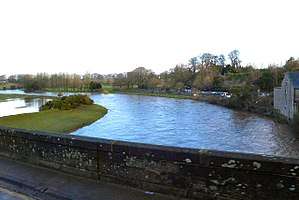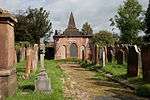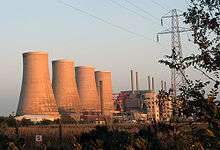Annan, Dumfries and Galloway
Annan (/ˈænən/ AN-ən; Scottish Gaelic: Inbhir Anainn) is a town and former royal burgh in Dumfries and Galloway, south-west Scotland. Historically part of Dumfriesshire, its public buildings include Annan Academy, of which the writer Thomas Carlyle was a pupil, and a Georgian building now known as "Bridge House". The Town Hall was built in Victorian style in 1878, using the local sandstone. Annan also features a Historic Resources Centre. In Port Street, some of the windows remain blocked up to avoid paying the window tax.
| Annan | |
|---|---|
 Annan Location within Dumfries and Galloway | |
| Population | 8,389 [2] (2001 Census) est. 8,480[3] (2006) |
| OS grid reference | NY 192 661 |
| • Edinburgh | 67 mi (108 km) |
| • London | 273 mi (439 km) |
| Council area | |
| Lieutenancy area | |
| Country | Scotland |
| Sovereign state | United Kingdom |
| Post town | ANNAN |
| Postcode district | DG12 |
| Dialling code | 01461 |
| Police | Scotland |
| Fire | Scottish |
| Ambulance | Scottish |
| UK Parliament | |
| Scottish Parliament | |

Each year on the first Saturday in July, Annan celebrates the Royal Charter and the boundaries of the Royal Burgh are confirmed when a mounted cavalcade undertakes the Riding of the Marches. Entertainment includes a procession, sports, field displays and massed pipe bands.
Geography
Annan stands on the River Annan—from which it is named—nearly 2 miles (3 km) from its mouth, accessible to vessels of 60 tons as far as Annan Bridge and 300 tons within 1⁄2 mile (800 m) of the town.[4] It is 15 miles (24 km) from Dumfries by rail,[5] in the region of Dumfries and Galloway on the Solway Firth in the south of Scotland. Eastriggs is about 3 miles (5 km) to the east and Gretna is about 8 miles (13 km) to the east.
History
Roman remains exist nearby.[5]
The Mote of Annan formed the original home of the de Brus family, later known as the Bruces, lords of Annandale,[5] which most famously produced Robert the Bruce. It was at the Battle of Annan in December 1332 that Bruce supporters overwhelmed Balliol's forces to bring about the end of the first invasion of Scotland in the Second War of Scottish Independence. The Balliols and the Douglases were also more or less closely associated with Annan.[5] Annan Castle once stood in the old churchyard and was originally the church tower.
The Battle of Bruce's Acres was fought near Newbie Castle against the English in the 13th century.
Bruce's Well is a natural spring that lies on the edge of the River Annan just downstream of the Gala Burn and Glen. It is associated with Robert the Bruce as recorded by Historic Environment Scotland.*Bruce's Well
During the period of the Border lawlessness the inhabitants suffered repeatedly at the hands of moss-troopers and through the feuds of rival families, in addition to the losses caused by the Scottish Wars of Independence.[5] During his retreat from Derby, Bonnie Prince Charlie stayed in the High Street at the inn where Back to the Buck now stands.
With the river embanked, Annan served as a maritime town whose shipyards built many clippers and other boats. A cairn on the jetty commemorates Robert Burns, who worked as an exciseman here in the 1790s. Although the port is now mainly dry, a few stranded boats remain.
Annan Academy has a history that goes back to the 17th century and alumni including Thomas Carlyle.[5] Its current campus on St John's Road primarily dates to the 1960s.
After the Acts of Union 1707, Annan, Dumfries, Kirkcudbright, Lochmaben and Sanquhar formed the Dumfries district of burghs, returning one member between them to the House of Commons of Great Britain.[4] Annan previously formed a constituency of the Parliament of Scotland and the Convention of Estates. In 1871, the Dumfries Burghs had a population of 3,172 and the royal burgh of Annan had 4,174, governed by a provost and 14 councillors.[4] A Harbour Trust was established in 1897 to improve the port.[5] The small Newbie Harbour lay on the other side of the River Annan near Newbie Mill and served the old Newbie Castle and barony.
By 1901, the population was 5,805, living principally in red sandstone buildings.[5]
The railway turntable was designed and developed in Annan; it can be seen today at the National Railway Museum, York.
Landmarks
Just outside the town, the Chapelcross nuclear power station has now shut down and is being decommissioned. The four cooling towers were demolished in 2007.
Nearby, John Maxwell, 4th Lord Herries, built Hoddom Castle (c. 1552–1565).
To the east of the town lies the settlement of Watchill and the similarly named Watchhall.
Part of the A75 between Annan and Dumfries is reported to be haunted.[6][7]
Distillery
Annandale distillery has now officially re-opened in Annan, which last produced a Lowland Malt 90 years ago, although it is still in early stages.[8]
Churches
Annan is served by several churches of different denominations, including:
- Annan Old Parish Church, High Street (Church of Scotland)[9]
- St. Andrew's Parish Church, Bank Street (Church of Scotland)[10]
- Annan URC, Station Road (United Reformed Church)
- St. John's Church, St. John's Road (Scottish Episcopal Church)
- St. Columba's Church, 40 Scotts Street (Catholic Church) Built as a Congregational Church in 1794 became a Catholic church in 1839. Added to in 1904 by Charles Walker of Newcastle as the gift of the parish priest the Rev Canon Lord Archibald Douglas.[11]
There is also a local interchurch group, known as Annandale Churches Together.[12]
Economy
In the 19th century, Annan was connected to the Glasgow & Southwestern Railway, the Caledonian Railway, and the Solway Junction Railway. It exported cured hams, cattle, sheep, and grain to England; it also produced cotton goods, ropes, ships, and salmon.[4] By the First World War, it was also a center of bacon-curing, distilling, tanning, sandstone quarrying, and nursery-gardening.[5]
Transportation
Annan Bridge, a stone bridge of three arches, built between 1824 and 1827, carries road traffic over the River Annan.[5] It was designed by Robert Stevenson and built by John Lowry. There is also a railway bridge[5] and a nearby pedestrian bridge over the Annan. It is still served by the Annan railway station, the old Solway Junction Railway station Annan Shawhill having closed to passengers in 1931 and freight in 1955.
Outdoor activity
Annandale Way is a 53-mile (85 km) walking route[13] that was opened in September 2009.[14] The route runs through Annandale, from the source of the River Annan to the sea; it passes through the town of Annan and offers interesting walking both up river and down from the town.
Notable people
- Andy Aitken – professional footballer best known for his long service with Queen of the South F.C.[15]
- Cameron Bell – footballer
- Thomas Blacklock - (1721–1791), Scottish poet.
- Thomas Carlyle
- David Gow - engineer
- Edward Irving - there is a statue of him in the grounds of Annan Old Parish Church. The statue was relocated from outside the town hall in the 1960s.
- Ashley Jensen – actress, best known for her roles in Extras and Ugly Betty.
- George Johnston – Leader of the New South Wales rum rebellion, briefly Lieutenant-Governor there
- David Leslie (racing driver)
- William Ewart Lockhart (1846–1900) – artist
- Robert Murray M'Cheyne – preacher, ordained by the Annan Presbytery.
- David Payne (1843–1894) – landscape artist.
- Jim Wallace, MSP for Orkney between 1999 - 2007 and the Deputy First Minister of Scotland between 1999 - 2005, born in Annan.
- Hardy Wright – greyhound trainer who lived initially at Watchhall, responsible for bringing the Barbican Cup (coursing) to Scotland for the first time.
- Jack Wright – coursing enthusiast, who lived at Watchhall, father of Hardy Wright.
Gallery
 The Riding of the Marches, Annan, dating back to 13th century.
The Riding of the Marches, Annan, dating back to 13th century. Annan
Annan High Street
High Street Annan Old Parish Churchyard.
Annan Old Parish Churchyard. Annan Academy (old buildings)
Annan Academy (old buildings) War memorial, High Street
War memorial, High Street Bruce statue,Town hall
Bruce statue,Town hall Chapelcross power station (cooling towers now demolished)
Chapelcross power station (cooling towers now demolished)
See also
Notes
- Ainmean-Àite na h-Alba ~ Gaelic Place-names of Scotland
- Browser Population. Scrol.gov.uk. Retrieved on 2013-05-05. Archived 13 February 2012 at the Wayback Machine
- Publications and Data. General Register office for Scotland.
- EB (1878).
- EB (1911).
- Cohen, Daniel; Marchesi, Stephen (1992). "The Annan Road Horrors". Railway Ghosts and Highway Horrors. London: Apple. pp. 61–66. ISBN 0-590-45423-4.
- rale (18 June 2010). "The Four Most Frightening Roads You Can Travel". Weird Worm. Retrieved 27 January 2011.
- A Sleeping Beauty Awakens, Annandale Distillery Archived 7 July 2011 at the Wayback Machine. Annandaledistillery.com. Retrieved on 2013-05-05.
- Annan Old Parish Church
- St. Andrew's Parish Church
- "scotlandschurchestrust.org.uk".
- "Annandale Churches Together", Annan.org.uk, retrieved 5 May 2013.
- Annandale Way website. Annandaleway.org. Retrieved on 2013-05-05.
- The Long Distance Walkers Association – Annandale Way. Ldwa.org.uk. Retrieved on 2013-05-05.
- Andy Aitken in the Queen of the South club history Archived 28 February 2012 at the Wayback Machine. Qosfc.com. Retrieved on 2013-05-05.
References

Attribution:

External links
| Wikimedia Commons has media related to Annan, Dumfries and Galloway. |

- Annan Online
- Annan Academy Website
- Annan Juvenile Pipes & Drums
- Local Authority website
- National Library of Scotland: Scottish Screen Archive (archive film compilation of local events in Annan, 1925 – 1937)
- Video history of the Mote of Annan
- Video footage of Annan Harbour
- Video footage of the Gala Glen and Bruce's Well